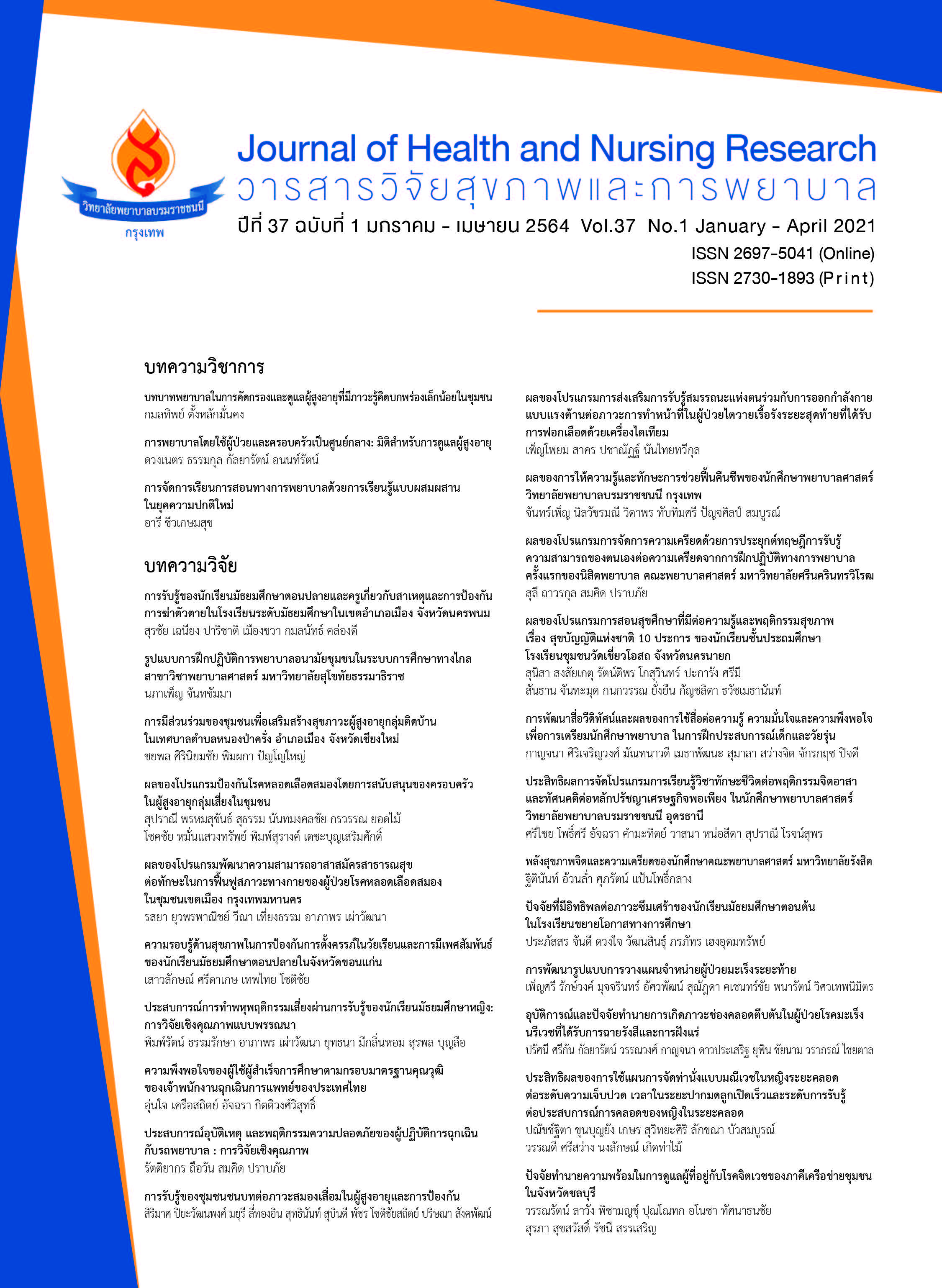ประสิทธิผลการจัดโปรแกรมการเรียนรู้วิชาทักษะชีวิตต่อพฤติกรรมจิตอาสา และทัศนคติต่อหลักปรัชญาเศรษฐกิจพอเพียง ในนักศึกษาพยาบาลศาสตร์ วิทยาลัยพยาบาลบรมราชชนนี อุดรธานี
คำสำคัญ:
โปรแกรมการเรียนรู้วิชาทักษะชีวิต, พฤติกรรมจิตอาสา, ปรัชญาเศรษฐกิจพอเพียง, นักศึกษาพยาบาลบทคัดย่อ
บทนำ: การจัดการเรียนการสอนวิชาทักษะชีวิตมุ่งเน้นให้นักศึกษาพยาบาลมีทักษะต่าง ๆ ที่จำเป็นในการดำเนินชีวิต บูรณาการเรียนการสอนร่วมกับการจัดกิจกรรมพัฒนาทักษะด้านจิตอาสาและเสริมทักษะด้านปรัชญาเศรษฐกิจพอเพียง ส่งเสริมให้นักศึกษาพยาบาลมีคุณลักษณะที่พึงประสงค์ตามอัตลักษณ์ของสถาบัน วัตถุประสงค์การวิจัย: เพื่อศึกษาผลและทดลองโปรแกรมการเรียนรู้วิชาทักษะชีวิตต่อ พฤติกรรมจิตอาสา และทัศนคติต่อหลักปรัชญาเศรษฐกิจพอเพียง ในนักศึกษาพยาบาลศาสตร์ วิทยาลัยพยาบาลบรมราชชนนี อุดรธานี ระเบียบวิธีวิจัย: การวิจัยกึ่งทดลองแบบกลุ่มเดียววัดผลก่อนและหลังการทดลอง ในกลุ่มนักศึกษาพยาบาลศาสตร์ ชั้นปีที่ 1 วิทยาลัยพยาบาลบรมราชชนนี อุดรธานี ที่เรียนรายวิชาทักษะชีวิต ทั้งหมดจำนวน 191 คน เครื่องมือประกอบด้วย 1) เครื่องมือในการทดลอง ได้แก่ โปรแกรมการเรียนรู้วิชาทักษะชีวิต ซึ่งประกอบด้วย 3 กิจกรรม คือ กิจกรรมการเรียนในรายวิชาทักษะชีวิต, การศึกษาดูงานหลักปรัชญาเศรษฐกิจพอเพียงตามแนวพระราชดำริ ในหลวงรัชกาลที่ 9 และ การออกแบบโครงงานและจัดกิจกรรม จิตอาสา และกิจกรรมเศรษฐกิจพอเพียง 2) เครื่องมือที่ใช้ในการเก็บรวบรวมข้อมูล ประกอบด้วย แบบสอบถามข้อมูลทั่วไป แบบวัดพฤติกรรมจิตอาสา1 และ แบบสอบถามทัศนคติต่อหลักปรัชญาเศรษฐกิจพอเพียง2 ผลการวิจัย: คะแนนเฉลี่ยพฤติกรรมจิตอาสา ก่อนและหลังการเข้าร่วมโปรแกรมการเรียนรู้วิชาทักษะชีวิต แตกต่างกันอย่างมีนัยสำคัญทางสถิติ (t(190) = 10.85, p < .001) โดยหลังเข้าร่วมโปแกรม (M =129.13, SD = 27.83) สูงกว่าก่อนเข้าร่วมโปรแกรม (Mean = 112.19, SD = 29.38) และคะแนนเฉลี่ยทัศนคติ ต่อหลักปรัชญาเศรษฐกิจพอเพียง ก่อนและหลังการเข้าร่วมโปรแกรม แตกต่างกันอย่างมีนัยสำคัญทางสถิติ (t(190) = 14.11, p < .001) โดยหลังการเข้าร่วมโปรแกรมการเรียนรู้วิชาทักษะชีวิต (Mean = 63.46, SD= 9.42) สูงกว่า ก่อนเข้าร่วมโปรแกรม (Mean = 56.70, SD =8.20) สรุปผล: โปรแกรมการเรียนรู้วิชาทักษะชีวิต สามารถเพิ่มพฤติกรรมจิตอาสา และทัศนคติต่อหลักปรัชญาเศรษฐกิจพอเพียง ควรเพิ่มการบูรณาการกิจกรรมร่วมกับงานกิจการนักศึกษา ข้อเสนอแนะ: ควรมีนำโปรแกรมไปใช้และทำวิจัยซ้ำในวิทยาลัยพยาบาลอื่นๆ เพื่อส่งเสริมอัตลักษณ์ของนักศึกษาพยาบาล
Downloads
เอกสารอ้างอิง
Sriboriboon N. Development of a causal model of students’ volunteer mind in the upper secondary schools under the office of the basic education commission [Master’thesis]. Bangkok : Chulalongkorn University ; 2007. (in Thai).
Pankaew P. Attitudes toward Sufficiency Economy Philosophy, Quality of Work Life, and Socail and Organization Citizenship Behaviors of Employees in a Private Company. J Silpakorn University 2014;34(2):1-22. (in Thai).
World Health Organization. Life Skills Education for Children and Adolescents in School. Geneva : World Health Organization ; 1997.
Erawan P. Developing Life Skills Scale for High School Students through Mixed Methods Research. European Journal of Scientific Research 2010;47(2):169-86.
Boonyanusit K. Development of instructional model for enhancing respectful mind and ethical mind based on teaching and leaning via service leaning for undergraduate students [doctoral’thesis]. Bangkok : Srinakharinwirot University ; 2011. (in Thai).
Saengpolisith U. Philosophy of “Sufficieacy Economy” by His Majesty King Bhumibol Adulyadej. J of Buriram Rajabhat University 2018:10(1);183 -8. (in Thai).
Voracharoensri S. A study of life skilld and a training group model construction for developing life skills of adolescent students [doctoral’thesis]. Bangkok : Srinakharinwirot University ; 2007. (in Thai).
Rovinelli RJ, Hambleton RK. On the use of content specialists in the assessment of criterion - Referenced test item validity. Dutch journal of education research. 1977;2:49-60.
Ananwarapong A., Pronthadawitt N. The Comparison of Life Skill and Quality of Life in Family of Home Economics Students in Rajamangala University of Technology Krungthep. Bangkok : Rajamangala University of Technology Krungthep ; 2007. (in Thai).
Throngyu S,Kijithorntham W, Choochom O. Effect of the Volunteer spirit development program based on service leaning by teaching profession students of Udonthani Rajabhat University 2017;11(25):153 – 63. (in Thai).
Supapoj N. Volunteer Mind of Undergraduate Dtudents of Rajabhat Universities in Bangkok Metropolitan Area. J Chandrakasem Rajabhat University 2018;13(1):78-88. (in Thai).
Pongsuwan, N. Factors Affecting the Success of the Application of The Philosophy of Sufficiency Economy in Samut Songkram Province [Master’thesis]. Bangkok : Ramkhamhaeng University ; 2010. (in Thai).
Wongaree W, Thawornratana C, Jai-aree A. The Relation between sufficiency Economy and Quality of Life of Students at Sua Phung Wittaya School, Ratchaburi Province. j of Education and Human Development Sciences 2017;1(1):51-9. (in Thai).
Khumhome B, Juntarukka S. The model application of sufficiency economy philosophy of the students, the faculty of management science, Ubonratchatani University. J Panyapiwat 2015 ; 7(Special) : 86 -98. (in Thai).
Thamaphiban W. A development of enrichment curriculum to enhance desirsble public mind for undergraduate students at Thaksin University, Songkhla campus [doctoral’thesis]. Bangkok : Srinakharinwirot University ; 2012. (in Thai).
Reunreang T. The integration of sufficiency economy philosophy in bachelor of nursing science programme of Praboromarajchanok institute, the ministry of public health [doctoral’thesis]. Bangkok : Chulalongkron University ; 2009. (in Thai).
ดาวน์โหลด
เผยแพร่แล้ว
รูปแบบการอ้างอิง
ฉบับ
ประเภทบทความ
สัญญาอนุญาต
บทความที่ได้รับการตีพิมพ์ เป็นลิขสิทธิ์ของวารสารวิจัยสุขภาพและการพยาบาล (วิทยาลัยพยาบาลบรมราชชนนี กรุงเทพ) ไม่สามารถนำไปตีพิมพ์ซ้ำในวารสารฉบับอื่น


















